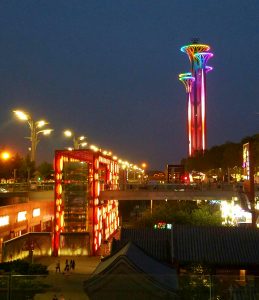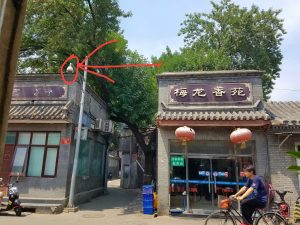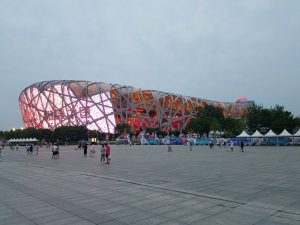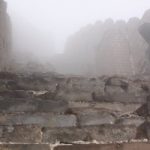So cautioned Marco Polo as he left the court of the great Kublai Khan in Dadu (modern day Beijing) in the year 1295 C.E. Certainly this was a timely reminder for me as I stepped off the plane in Beijing for the first time. Over the years, I had heard lots about Beijing, most of which with a negative slant. Much to my delight, I encountered a wonderful and fascinating city full of surprises and contradictions. If you are looking for a mundane listing of “things to see,” you are reading the wrong article. There’s plenty of that elsewhere. Rather, allow me to share my off-beat musings and impressions as a rookie to Beijing.
Trees, trees everywhere
You probably associate Beijing with thick smog. And you would be right. But I bet you didn’t know that Beijing has more trees than you can shake a stick at (pun intended.) I have rarely seen a city so green before. They line its umpteen grand boulevards and ring its innumerable skyscrapers. Why no one ever observes upon this is beyond me. A pleasant surprise indeed.
Don’t believe the hype: people are not rude
Surprise number two: Chinese people behaved rather differently in public than what I had been warned about. Perhaps you’ve also heard the copious cautions about different social norms of the Beijing public? In what might be pure affronts to many foreign travelers, people on the streets of Beijing are said to routinely spit on the ground, push and shove other pedestrians, act rudely, cut in any line and smoke at all times. Even my AirBnB hosts warned me of this in advance. Yet, I found none of this to be true. Public behavior in Beijing can only be described as courteous and respectful, no different than visiting Tokyo or Vancouver.
You are safe. Because you are watched.
Government authorities seem to closely monitor all aspects of street life in China’s semi-militarized capital. Every intersection and every corner is acutely scrutinized by cameras or security personnel, even down to tiniest of back alleys.
Ostensibly there to “maintain public peace and harmony,” government minders are stationed on each block, dressed in black uniforms and armed with walkie-talkies. They don’t interact much with the population and people on the street mostly ignore them, though I made sure to always greet the local guards with a friendly smile. In addition, occasional military vehicles, full of armed soldiers, also patrol the city streets. One positive side effect of this fierce security ring: it creates an atmosphere where one feels almost completely safe from street crime.
Where are all the foreigners?
Visit major international cities such as London, Los Angeles, Mexico City, Tokyo, Berlin, New York or Capetown and you’ll find these cultural capitals teeming with foreign tourists. Naturally, one would assume that China’s political and cultural epicenter might also be host to hordes of foreign visitors. One would be wrong. While plenty of domestic visitors abounded in the city, I found relatively few international tourists, even at world-famous destinations such as the Temple of Heaven, the Forbidden City or the nearby Great Wall. This observation surprised me perhaps the most of all. My impressions were further cemented by the reality that these tourist sites made little to no effort to provide assistance in any foreign languages.
(Note: while difficult to ascertain people’s origin without actually asking them, most people at Beijing’s tourist spots tended to speak Mandarin. From this, I infer that they were largely domestic visitors.)
No, the Bird’s Nest is not falling apart
“Empty.” “Ruin.” “Decrepit.” “Abandoned.” So claim a myriad of media reports and articles about the state of Beijing’s vaunted National Stadium, known as the Birds’s Nest. Google “Bird’s Nest falling apart” and you’ll be hit with thousands of search results decrying its sad state of withering disrepair. Neglected and increasingly dilapidated, the Bird’s Nest has become a symbol of the pompous excesses hoisted upon an Olympic host city.Except, it does not appear to be true. Not that I am a structural engineer or have any expertise in the matter but when I visited the Bird’s Nest and the adjacent Olympic Village, they both appeared to be in perfectly fine shape to my layman’s eyes. A billboard boasted of numerous upcoming events and the Olympic village was the teeming epicenter of numerous nightly festivities. I don’t understand the origins of the negative coverage, but a visit to the Bird’s Nest is well worth it.
You don’t have to share the Great Wall with hordes of tourists
Mark Twain reminds us that “travel is fatal to prejudice….” My visit to Beijing once again reinforced this timeless lesson – in my case, prejudices about rude public behavior and dilapidated Olympic landmarks. It is easy to read about far away destinations, but nothing compares to the experience of a personal visit. I found myself both delighted and surprised by Beijing’s dichotomy of ancient and modern. Someday, I hope, you will be able to make your own impressions of Beijing. And if you are fortunate enough to have visited already, I’d love to hear your observations in the comments.
(Author’s Note: all photos taken by me personally.)









Leave a Reply